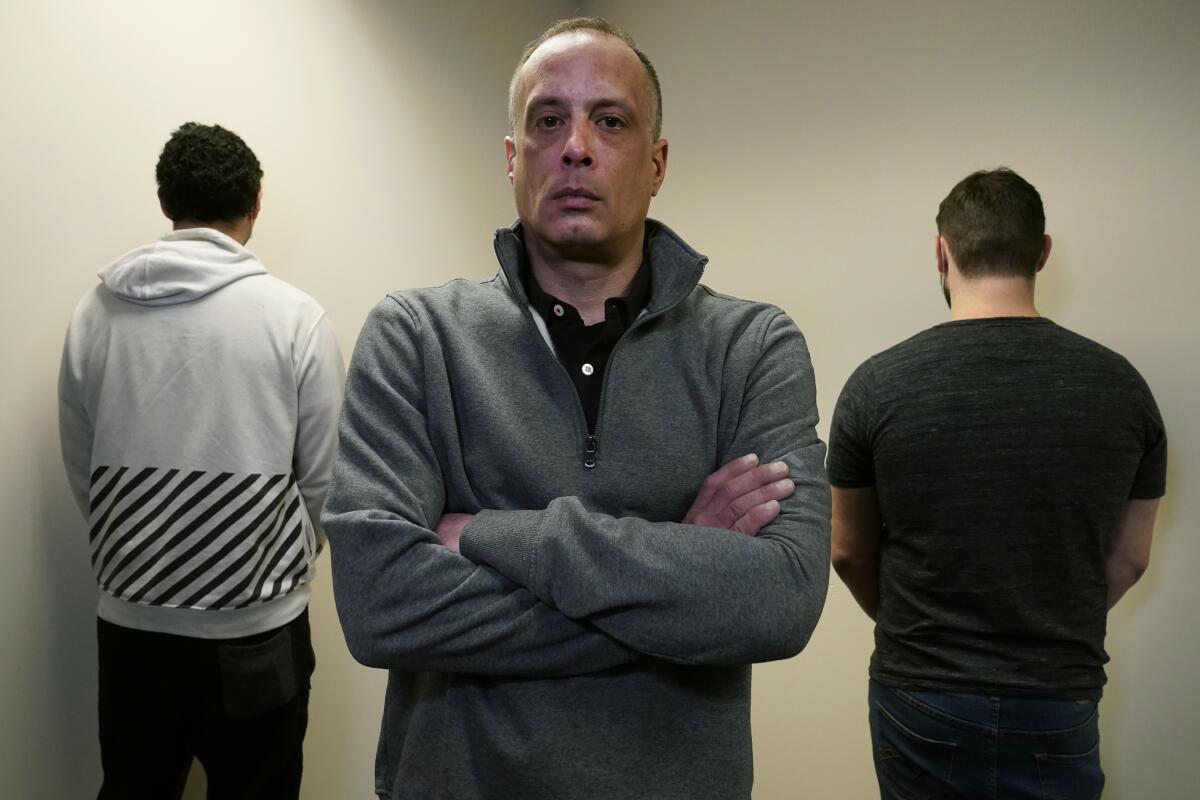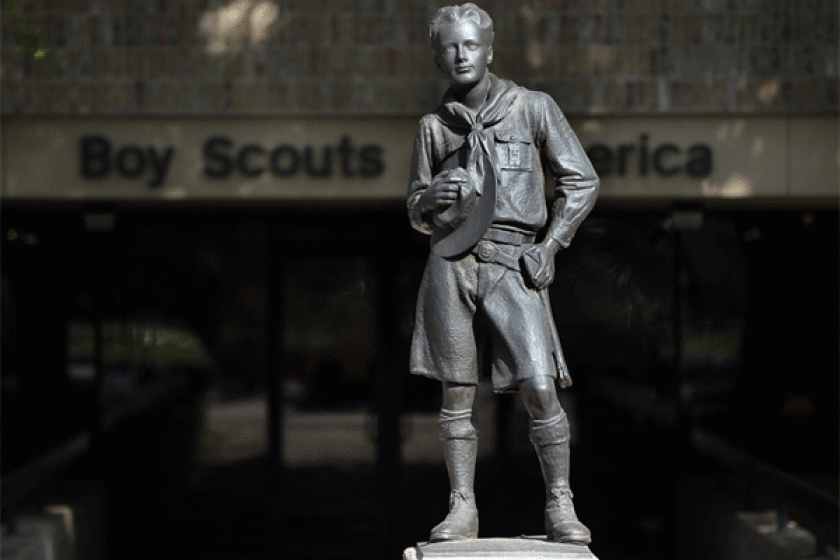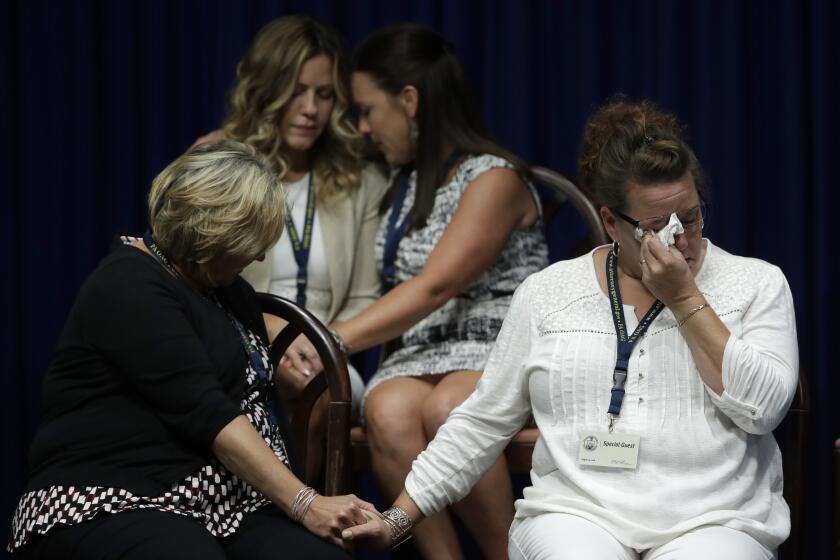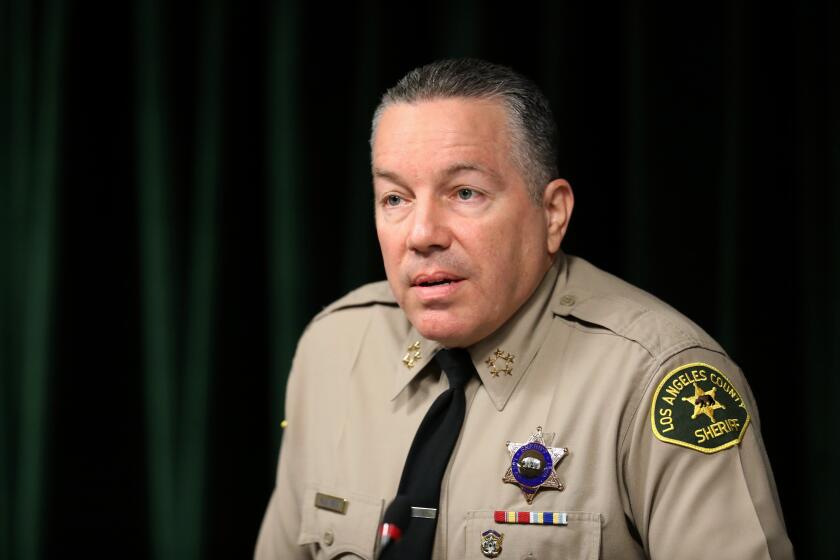Hundreds allege decades of abuse by staffers at New Hampshire youth center

- Share via
CONCORD, N.H. — Abuse allegations against New Hampshire’s state-run youth detention center now span six decades, with 150 staffers during that time accused of physically or sexually harming 230 children at a facility the victims’ attorney calls a “magnet for predators.”
The lawyer, Rus Rilee, sued the state in January 2020 on behalf of three dozen adults who alleged that they were abused as children at the Youth Development Center in Manchester between 1982 and 2014. He now represents 230 clients who say they were abused between 1963 and 2018, when they were 7 to 18 years old.
As the number of years, accusers and alleged perpetrators has swelled, so has the sickening nature of the allegations. While details beyond the updated number of accusers and time span aren’t included in latest court documents, Rilee plans to add his clients’ accounts to the complaint and described them to the Associated Press:
Of the 150 accused staffers, more than half are accused of sexual abuse, Rilee said. Children were allegedly gang-raped by counselors, beaten while being raped and forced to sexually abuse each other, he said. Some ended up with sexually transmitted diseases; one ended up pregnant.
Staff members choked children, beat them unconscious, burned them with cigarettes and broke their bones, Rilee alleged. Counselors set up “fight clubs” and forced kids to compete for food. Children were locked in solitary confinement for weeks or months, sometimes shackled or strapped naked to their beds. Kept away from classrooms while their injuries healed, some can’t read or write today, he said.
“These broken, shattered children were then unleashed into society with no education, no life skills and no ability to meaningfully function,” said Rilee.
The number of sexual abuse claims and eventual payouts will likely reshape the future of the Boy Scouts of America.
The Manchester facility, now called the Sununu Youth Services Center after former Gov. John H. Sununu, serves children ordered by the juvenile justice system to live in a secure institutional setting. The average population last year was just 17 residents overseen by about 90 employees, though it once housed more than 100 youths and employed a larger staff.
Joe Ribsam, director of the state Division for Children, Youth and Families, said the agency continues to cooperate with a broad criminal investigation into the center, which was launched by the attorney general’s office in 2019. He did not comment on the new allegations.
“The facility’s policies and systems that protect the youth receiving care include full compliance with the Prison Rape Elimination Act and security cameras throughout the facility to provide additional sets of eyes on staff and student interactions,” Ribsam said in a written statement.
It’s unclear how far up the chain of command that knowledge of the alleged abuse traveled over the years. But the lawsuit alleges that some supervisors were themselves abusers and that other staffers looked the other way.
U.S. Roman Catholic bishops tallied 4,434 sex abuse allegations against clergy in 2018-19 — triple the number from the previous year.
“The systemic, governmental child abuse that occurred was allowed to occur because there wasn’t sufficient oversight, and the state was institutionally negligent in their hiring, training, supervision and retention polices,” Rilee said. “It’s pretty clear to me that this facility was a magnet for predators.”
Rilee said most of his clients had spoken to state police as part of the criminal investigation, including one man who spent two years at the facility in the late aughts. The man alleges that he was sexually assaulted by two staffers more than half a dozen times, was beaten by six staff members at once and often locked in his room for a week at a time. Now 28, he said he has been in and out of the criminal justice system most of his life, and has struggled with depression, strained relationships and a warped sense of socially acceptable behavior.
“The kids that don’t have it good in there, we don’t come out good,” he said. “It takes a part of you. The worthlessness you feel afterwards. ‘Am I good enough for people? Am I good enough for myself?’”
Another man, now 29, spent more than a year at the center starting in 2007. He alleges that he was beaten several times and sexually assaulted by three different staff members dozens of times, including a sexual assault that he says was recorded on a perpetrator’s cellphone. After years of substance abuse, he has been clean for seven months, but nightmares and other post-traumatic stress disorder symptoms continue.
“I relive it a lot — every night, every other night. It never stops,” he said.
Breaking News
Get breaking news, investigations, analysis and more signature journalism from the Los Angeles Times in your inbox.
You may occasionally receive promotional content from the Los Angeles Times.
Neither man has any records of his time at the center, though both said they have requested them and gave state police officers who interviewed them permission to do the same.
The Associated Press does not typically name people who say they have been victims of sexual assault, unless they go public, like the lawsuit’s lead plaintiff, David Meehan.
Meehan, 39, went to police in 2017 with allegations of abuse from the 1990s. In July 2019, two of his former counselors were charged with 82 counts of rape, and the attorney general’s office launched a broader criminal investigation into the center’s operations and employees from 1990 to 2000.
Those charges were dropped last March, when the office announced that it was devoting “an unprecedented allocation” of resources to an expanded investigation, including assigning 10 state police troopers to a task force.
Since the coronavirus outbreak closed schools and largely hidden children at home, the reports of suspected abuse have dropped by as much as 50%.
The state has been granted several extensions in responding to the lawsuit, and, as recently as January, it said in court documents that the parties were “in discussions aimed at narrowing or resolving the matters in issue in this case.” But earlier this month, the state filed a motion to dismiss the case, in part because it said the case didn’t meet the criteria for a class-action suit.
The attorney general’s office declined to comment on the new allegations or the lawsuit.
“There are dedicated prosecutors in the Attorney General’s Office as well as investigators from New Hampshire State Police who are working daily on this investigation,” acting Atty. Gen. Jane Young said in a written statement. “The investigation will follow the evidence wherever it leads.”
In a recent interview, Meehan said he had been frustrated by the pace of the legal process but understood it would take time. He said he has grown stronger every day, in part because he has inspired others to come forward, including the two who spoke to the AP.
“It’s heartwarming in a way to know that I helped these other people find the strength to be able to speak the truth about their experience,” he said. “But at the same time, it hurts in a way that I can’t explain, knowing that so many other people were exposed to the same types of things that I was.”
He said he has no regrets about speaking out.
“I can’t allow the abuse that I endured to be what destroys my life anymore,” Meehan said.
More to Read
Sign up for Essential California
The most important California stories and recommendations in your inbox every morning.
You may occasionally receive promotional content from the Los Angeles Times.













